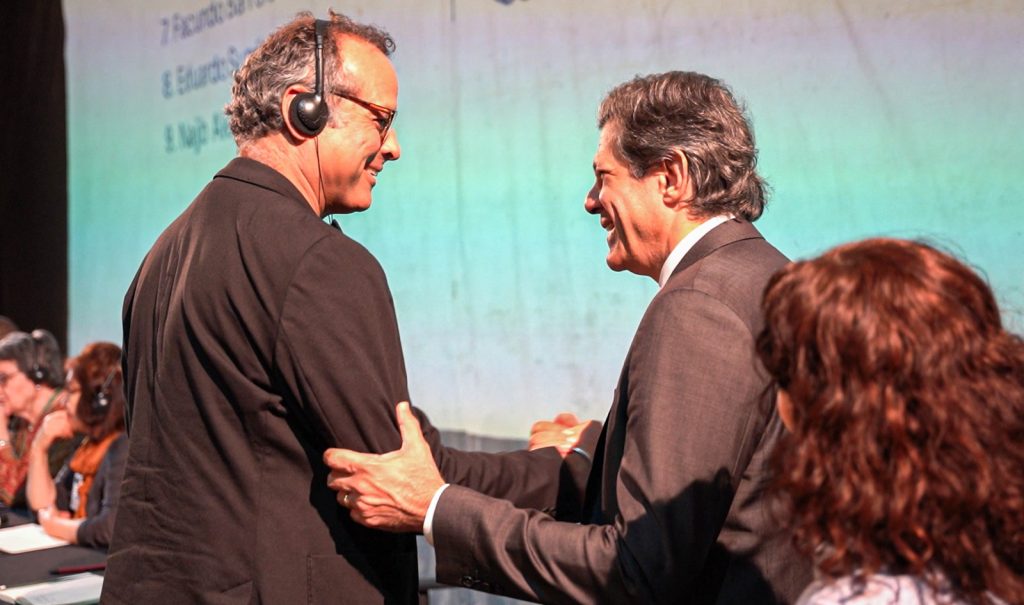During the opening of the conference Dilemmas of Humanity: Perspectives for Social Transformation, held on Tuesday (8) at Sesc Pompeia in the city of São Paulo, Brazilian Finance Minister Fernando Haddad defended taxing the super-rich to combat social inequality and criticized the limits imposed by the conservatism of the country’s Congress on the actions of the government of President Luiz Inácio Lula da Silva (Workers’ Party). He also warned of the advance of the extreme right in the world and called on the international left to be bolder and more ambitious in proposing structural transformations.
In his speech, Haddad focused on the bill that exempts Brazilians with salaries of up to BRL 5,000 (US$ 842) a month from income tax. According to him, the proposal sent by the federal government to Congress directly benefits around 10 million Brazilians with a total exemption, as well as another 5 million with a reduction in the tax rate – all financed by the minimum tax levied on 141,000 people with annual incomes above BRL 1 million (US$ 168,440).
“For every super-rich in Brazil, we manage to benefit 100 workers: two-thirds with an exemption and one-third with a tax reduction. We are among the ten largest economies in the world, but also among the ten most unequal countries. This is the paradox of many economies around, and it’s not specific to Brazil. Many countries with extremely high-income inequality can use the example that Brazil has set,” he said.
The minister acknowledged that the progressive sector considers the proposal “unambitious” but explained that the limits stem from the conservative composition of the National Congress. “We are a progressive government on a broad front because the democratic right is part of our government. However, it has a very conservative Congress,” he said. However, he guaranteed he knew how to “navigate this territory”.

Proposal for a global fund to fight hunger and the climate crisis
Haddad also stressed Brazil’s role as president of the G20 and the country’s proposal to create a global fund to fight hunger and climate change financed by an annual tax of 2% on the wealth of the wealthiest families on the planet.
“There are 3,000 families, all of whom could fit into a condominium in São Paulo, with an estimated wealth of 15 trillion dollars. The proposal would raise 300 million dollars a year, a modest but significant amount capable of addressing the challenge of indebtedness, especially on the African continent, and to accelerate the energy transition,” he explained.
According to the minister, the G20 countries positively received the proposal and unanimously included it in the group’s official communiqué. “Brazil has created proposals that mobilize minds and hearts in the right direction in the search for a better world,” he said.
Brazil’s role in fighting inequality
Throughout his speech, Haddad also highlighted the current administration’s progress in social justice and sustainability. He mentioned the reduction of hunger in the country – from 33 million to 8 million people – and the social programs for income transfer. He also highlighted Brazil’s energy matrix, with 50% clean energy and 90% renewable electricity.
“We’re going to get Brazil off the hunger map by the end of President Lula’s current term,” he said.
The rise of the far right is a global obstacle
Haddad linked Brazil’s challenges to the international context. According to him, the growth of the far right in Western countries has jeopardized social justice, income redistribution, the fight against hunger and climate change agendas.
“Europe, the United States and South America have suffered from the boom of reactionary forces that have come to power and jeopardized the possibilities for reform in the sense of seeking economic and geopolitical balance and social justice,” he explained.
For the minister, the scenario demands more political courage and articulation from the progressive spectrum, including internationally. “To face the challenge of the extreme right, we must go beyond common sense because if they’re breaking down barriers on the other side, we have to break down barriers on this side and prevent chaos from taking hold. […] We have to recover the old tradition of having the greatest intellectuals from the progressive spectrum. The political activists who faced these challenges were progressive intellectuals,” he concluded.
The Dilemmas of Humanity conference brings together more than 70 political leaders, intellectuals and activists from popular movements from around the world until April 10. It is organized by the Landless Rural Workers’ Movement (MST, in Portuguese), the Tricontinental: Institute for Social Research and the International Peoples’ Assembly (IPA).




